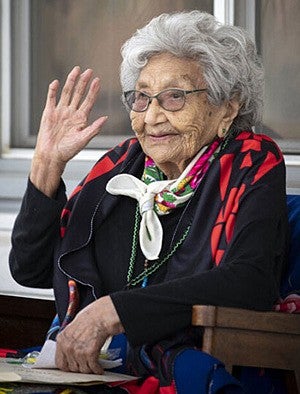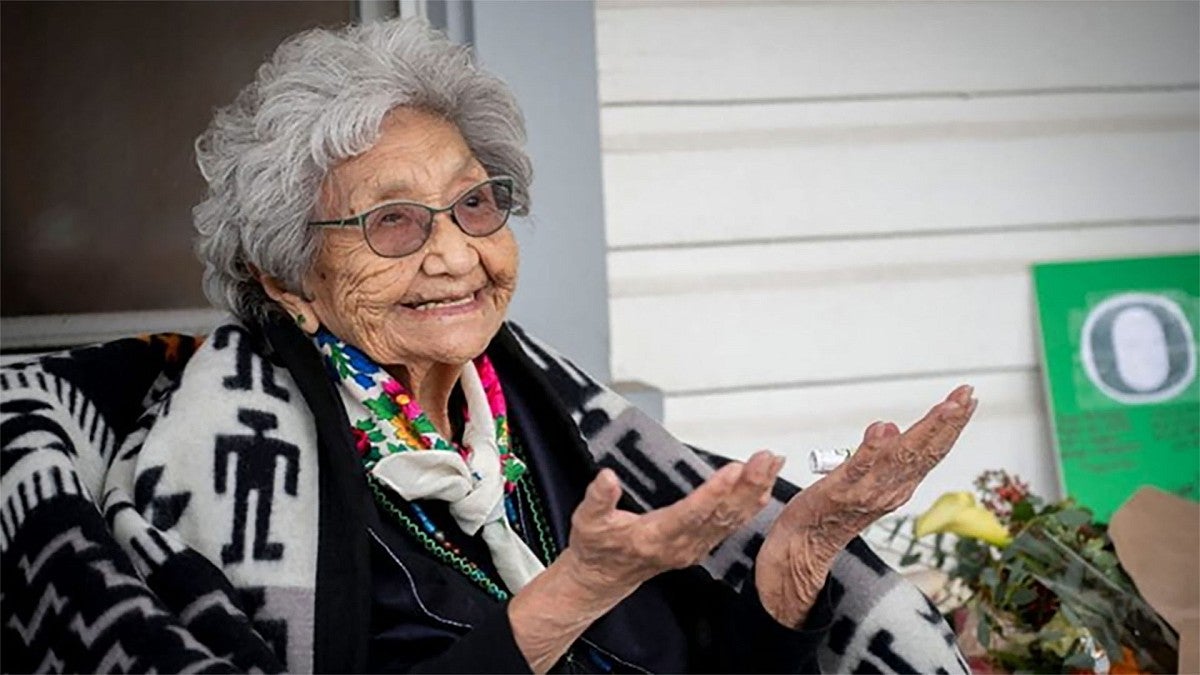Virginia Beavert, a much-loved Yakama Nation elder and an honored UO graduate who dedicated her life to preserving Native languages and culture, died Feb. 8 at the age of 102.
Beavert, also known by her Yakama name, Tuxámshish, was the oldest person to earn a degree at the University of Oregon when she received her doctorate at age 90. Among her many accomplishments and contributions, she helped found the UO’s Northwest Indian language Institute, mentored and inspired generations of students, helped her stepfather write the first dictionary of their Ichishkíin language and taught in the UO’s Sapsikwala Teacher Education program.
“Virginia leaves an academic and cultural legacy that is impossible to replace,” said Jason Younker, assistant vice president and adviser to the president on sovereignty and government to government relations at the UO as well as chief of the Coquille Indian Tribe. “To have earned a doctorate at the age of 90 and then teach until she was 102 is like climbing Mount Everest twice in the same day. I was always amazed and in awe of her dedication, as were all in our community who had the pleasure of knowing her. She will never be forgotten, and her contributions continue to live.”
Her colleagues and many friends said Beavert always was an inspiration to others throughout her long life.

“She taught all of us more than we could ever teach her,” professor Melissa Redford, head of the UO’s Department of Linguistics, wrote in a tribute. “Even those faculty and students distant from her efforts by virtue of our different research and teaching interests were impacted and changed by her example of engaged teaching, the passion of her mission, and her fundamental optimism and faith in younger people and their ability to also make a difference.”
Beavert was an accomplished linguist with a deep knowledge of Ichishkíin, also known as Sahaptin, and the languages of the Salish tribes. She taught Ichishkíin at Heritage University on the Yakama Indian Reservation in Toppenish, Washington, and directed its Sahaptin Language Program. She also was a teacher and board member at the Northwest Indian Language Institute and was a distinguished elder educator in the UO’s College of Education.
Andrew Sund, the president of Heritage University, called Beavert “a beacon of inspiration for language preservation and Indigenous cultural heritage.”
“We are immensely grateful for her tireless efforts in advancing cultural understanding and inclusivity,” he wrote in a remembrance.
Education was a central pillar in her life. At 14 she began working with cultural anthropologist and linguist Melville Jacobs, who recognized her already-strong abilities with the Ichishkíin and Salish languages.
She earned her bachelor’s degree in anthropology from Central Washington University in 1986 while in her 40s and a master’s in bilingual education from the University of Arizona in 2000. She also received an honorary doctorate from the University of Washington in 2009. The Yakama Nation also named its Tuxámshish Higher Education Center in her honor.
Beavert earned her UO doctorate in linguistics in 2012. Her dissertation documented and helped preserve ancient Yakama traditions and language and later was turned into a book, “The Gift of Knowledge/Ttnúwit Átawish Nch'inch'imamí: Reflections on Sahaptin Ways.”
A strong supporter of tribal sovereignty, Beavert applied her knowledge of Native languages to treaty rights. As a tribal activist she would help translate for tribal members charged with violating state fishing regulations.
Her list of accomplishments defy elision. She served in the Women’s Army Corps in World War II, was the first woman elected as secretary-treasurer of the Yakama General Council, contributed to the medical records field and Hanford nuclear site programs, helped guide and support the Yakama Nation language program, wrote books on the stories and songs of Indigenous people and provided valuable cultural insight to many schools, interpretive programs, tribes and organizations. She also worked with the Confluence Project, connecting people to the history and culture of the Columbia River through recordings, and contributing language to the Story Circles at Sacajawea State Park in Pasco, Washington.
She also was featured in an Around the O story when she turned 100 and in a UO Alumni Association story last November marking Native American Heritage Month.
“Few touch so many lives while here,” said UO linguistics professor Spike Glildea. “May she find great joy on the other side. May we each be blessed to have the chance to fill a little of the hole she leaves in the life of our community.”
—Compiled from web and UO sources, including the Northwest Indigenous Languages Institute and Native American Indigenous Studies Association


